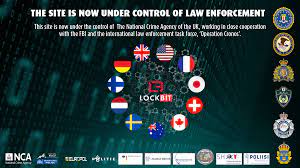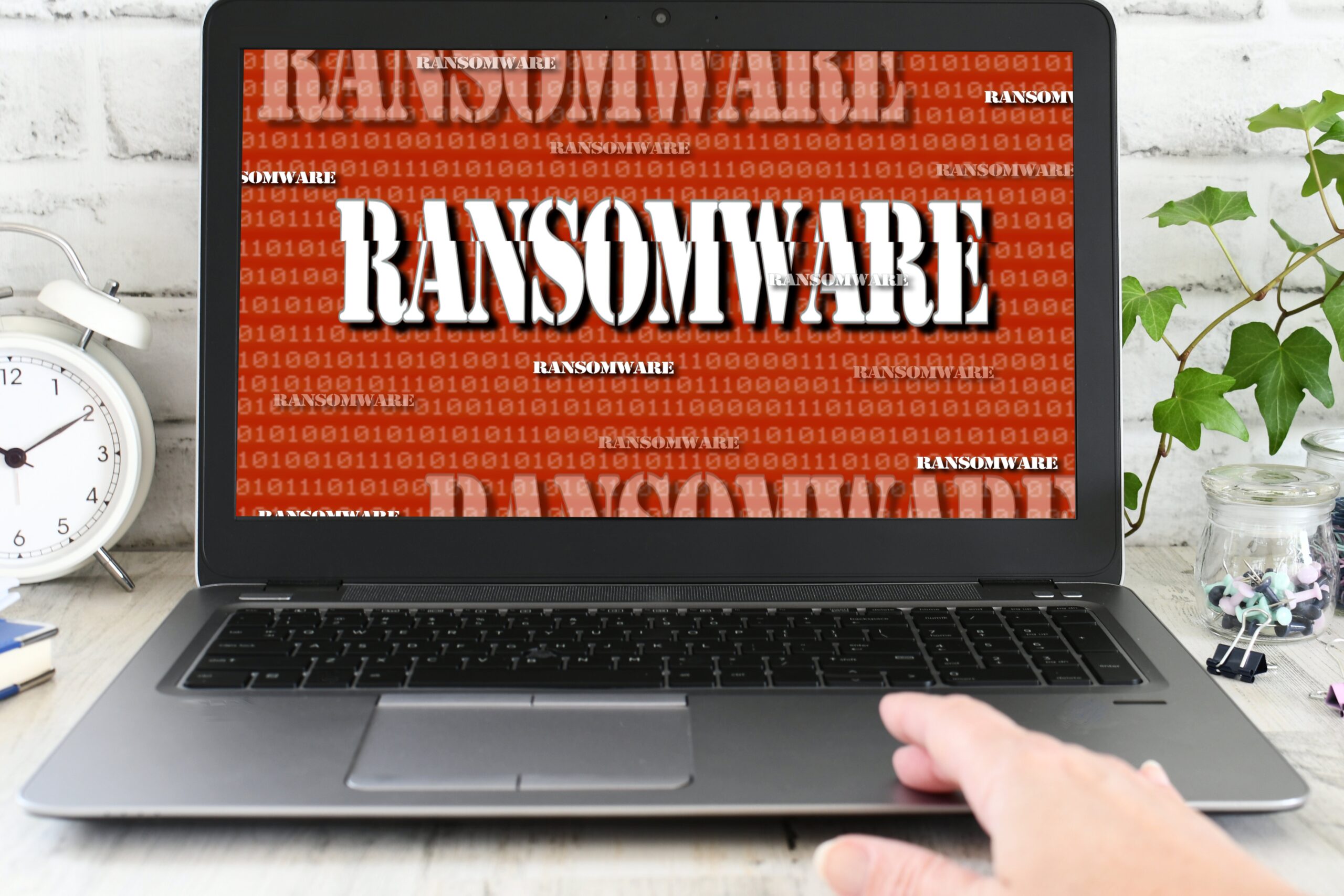Lockbit: UK leads disruption of major cyber-criminal gang
In recent news, the focus has been on Lockbit, a major cyber-criminal gang, and the significant role played by the United Kingdom in disrupting its operations. This article aims to provide an overview of Lockbit, its recent news coverage, and the crucial involvement of the National Crime Agency (NCA) and other international law enforcement agencies in dismantling this criminal network.

Lockbit has gained notoriety as one of the world’s largest criminal ransomware groups. Operating from a base believed to be in Russia, Lockbit has established itself as a dominant player in the ransomware market, offering its services to other criminals. Its activities involve hacking into computers belonging to companies and organisations, locking users out, and demanding ransom payments. In some cases, they also steal sensitive data and threaten to release it.
Recognising the gravity of Lockbit’s operations, the National Crime Agency (NCA) has taken the lead in disrupting this cyber-criminal gang. This operation marks a significant milestone in the fight against cybercrime, as it is the first of its kind to be led by the UK. The NCA, along with the support of the FBI, Europol, and other international law enforcement agencies, has infiltrated Lockbit’s systems and stolen crucial data, effectively crippling their operations.
The involvement of the NCA and its international counterparts in dismantling Lockbit demonstrates the commitment of these agencies to combating cybercrime on a global scale. Their collaborative efforts signify a united front against criminal networks, sending a clear message that no one is beyond the reach of justice.
In the following sections, we will delve deeper into Lockbit’s operations, the impact of the UK-led operation, and the strategies employed to disrupt this major cyber-criminal gang. By understanding the inner workings of Lockbit and the efforts made to dismantle it, we can gain valuable insights into the fight against cybercrime and the measures taken to safeguard individuals and organisations from such malicious activities.
Lockbit: The World’s Largest Criminal Ransomware Group
Lockbit has earned its reputation as the world’s largest criminal ransomware group, operating on a global scale. With its believed base in Russia, Lockbit has emerged as a dominant force in the ransomware market, providing its services to a vast network of criminals.

The volume of services offered by Lockbit is staggering, making it a highly sought-after resource among cybercriminals. Its operations revolve around hacking into the computer systems of various companies and organisations, effectively locking users out until a ransom is paid. In addition to the ransom demands, Lockbit often engages in data theft, further increasing the pressure on victims to comply with their demands.
One of the key factors that set Lockbit apart from other ransomware groups is its ability to establish itself as a dominant player in the market. Estimates suggest that Lockbit holds a significant share, around 20-25%, of the overall ransomware market. This level of influence showcases the group’s expertise and reach, posing a significant threat to global cybersecurity.
Lockbit’s emergence occurred around 2019, and since then, it has rapidly solidified its position as a major player, targeting high-profile organisations worldwide. Notable victims of Lockbit attacks include Royal Mail, which experienced disruptions to international deliveries in January 2023. The Industrial & Commercial Bank of China (ICBC) also fell victim to Lockbit, experiencing severe repercussions within the financial world. Other notable targets include suppliers to the NHS, law firm Allen & Overy, and aerospace giant Boeing.
This UK-led operation to disrupt Lockbit represents a crucial step in combating the group’s criminal activities. By understanding the inner workings of Lockbit and the extent of its operations, law enforcement agencies can develop effective strategies to dismantle the group’s infrastructure, disrupt its operations, and bring those responsible to justice.
In the upcoming sections, we will delve further into the UK’s operation to disrupt Lockbit, the impact it has had on the cyber-criminal world, and the measures taken to undermine the group’s operations. By shedding light on the actions taken against Lockbit, we aim to highlight the efforts made to safeguard individuals and organisations from the threats posed by this major cyber-criminal gang.
The UK’s Operation to Disrupt Lockbit
The United Kingdom, led by the National Crime Agency (NCA), has spearheaded an operation to disrupt Lockbit, marking a significant milestone in the fight against cybercrime. This operation is the first of its kind to be led by the UK, showcasing its commitment to combating cyber-criminal activities on a global scale.
Collaborating with international partners such as the FBI and Europol, the NCA has successfully infiltrated Lockbit’s systems and obtained crucial data that has dealt a significant blow to the criminal gang. The involvement of these international law enforcement agencies demonstrates the collective determination to dismantle cyber-criminal networks and bring their members to justice.


The UK’s role in leading the operation highlights its expertise in cybersecurity and its dedication to protecting individuals and organisations from the threats posed by ransomware groups like Lockbit. By taking the lead in this operation, the UK has shown its capability to disrupt and dismantle major cyber-criminal organisations, sending a clear message that such activities will not be tolerated.
The operation against Lockbit is a testament to the relentless efforts of law enforcement agencies worldwide to stay one step ahead of cybercriminals. By targeting the infrastructure and systems of Lockbit, the UK-led operation aims to disrupt the group’s operations, dismantle its network, and ultimately bring those responsible to justice.
In the subsequent sections, we will explore the targeting and impact of Lockbit, delve into the covert operation and data gathering, and discuss the public phase of the operation, shedding light on the measures taken to undermine the criminal activities of Lockbit. Through these efforts, the UK and its international partners aim to create a safer cyber landscape and protect individuals and organisations from the threats posed by such cyber-criminal gangs.
Lockbit’s Targeting and Impact
Lockbit, as a major cyber-criminal gang, has targeted a wide range of organisations, causing significant disruption and financial loss. Their modus operandi involves infiltrating the computer systems of companies and institutions, encrypting their data, and demanding ransom payments in exchange for restoring access.
One notable target of Lockbit’s attacks was the Royal Mail, the UK’s national postal service. In January 2023, Lockbit’s actions resulted in disruptions to international mail deliveries, causing inconvenience and financial losses for both individuals and businesses. This incident highlighted the detrimental impact that Lockbit’s activities can have on critical services.

Another high-profile victim of Lockbit was the Industrial & Commercial Bank of China (ICBC), one of the world’s largest banks. The attack on ICBC sent shockwaves through the financial sector, jeopardising customer data and undermining trust in the institution’s security measures.
Lockbit has also targeted suppliers to the UK’s National Health Service (NHS), posing a significant threat to healthcare systems. Such attacks can disrupt vital medical services, compromise patient data, and potentially endanger lives.
In addition to these high-profile cases, Lockbit has victimised numerous other organisations across various industries, including law firms, financial institutions, and multinational corporations. The financial and reputational consequences faced by these victims are substantial, as they have to navigate the aftermath of a breach, invest in cybersecurity measures, and regain the trust of their clients and stakeholders.
The tactics employed by Lockbit extend beyond mere data encryption. They often exfiltrate sensitive information from targeted systems, threatening to release it if the ransom demands are not met. This double-edged approach increases the pressure on victims and magnifies the potential damage caused by their actions.
The disruptive impact of Lockbit’s attacks is not limited to the immediate aftermath. It can have far-reaching consequences for the affected organisations, their customers, and the broader economy. These attacks highlight the urgent need for robust cybersecurity measures and collaborative efforts between law enforcement agencies to combat the ever-evolving threat landscape.
In the subsequent sections, we will explore the covert operation and data gathering conducted by law enforcement agencies, as well as the public phase of the operation, which aims to undermine Lockbit’s operations and restore a sense of security in the face of cybercriminal activities.
Covert Operation and Data Gathering
The operation to disrupt Lockbit has involved a meticulously planned covert operation, carried out by the National Crime Agency (NCA) and its international partners. The primary objective of this operation was to infiltrate Lockbit’s systems, gather crucial data, and gain insights into the inner workings of the criminal gang.
To accomplish this, skilled cyber investigators from the NCA, working in collaboration with their counterparts from the FBI, Europol, and other international law enforcement agencies, deployed advanced techniques and tools. These included sophisticated malware analysis, network forensics, and digital surveillance, enabling them to navigate the complex web of Lockbit’s infrastructure and identify key individuals involved in the criminal network.
The covert operation aimed to gather evidence to dismantle Lockbit’s operations and build strong cases against its members. By monitoring their communication channels, tracking financial transactions, and analysing their techniques, law enforcement agencies were able to gain valuable intelligence that would prove instrumental in disrupting the criminal gang.
One of the key aspects of the covert operation was the extraction of crucial data from Lockbit’s systems. By gaining access to their infrastructure, law enforcement agencies were able to retrieve encrypted data, which not only provided insights into the group’s operations but also ensured the recovery of valuable information for the victims of Lockbit’s attacks.
The data gathered during the covert operation served multiple purposes. It allowed law enforcement agencies to map out the structure of the criminal network, identify key players, and gather evidence that could be used to bring them to justice. Additionally, the data provided valuable insights into the techniques and tools employed by Lockbit, enabling cybersecurity experts to develop effective countermeasures and enhance the resilience of systems against future attacks.
The success of the covert operation demonstrates the expertise and dedication of the NCA and its international partners in combating cybercrime. By staying one step ahead of Lockbit and infiltrating their systems, law enforcement agencies have dealt a significant blow to the criminal gang, disrupting their operations and sending a clear message that cybercriminals will not go unpunished.
In the subsequent sections, we will delve into the public phase of the operation, where law enforcement agencies will work to undermine Lockbit’s operations, recover encrypted data, and restore a sense of security in the face of cybercriminal activities.
Public Phase: Undermining Lockbit’s Operations and Restoring Security
With the covert operation successfully gathering crucial data and dismantling Lockbit’s infrastructure, law enforcement agencies now enter the public phase of the operation. This phase aims to undermine Lockbit’s operations, disrupt their network, and restore a sense of security in the face of cybercriminal activities.
The Growing Threat of Conti Ransomware, Violation of Students’ Privacy by the Medusa Ransomware Gang, and Unveiling New Tricks by Black Basta
In addition to the disruption caused by Lockbit, there are other ransomware groups that pose a significant threat to United Kingdom cybersecurity landscape. Among these groups are Conti, Medusa, and Black Basta, each with their own unique tactics and targets.
Conti ransomware has emerged as a growing threat, targeting organisations across various sectors. This group utilises advanced encryption techniques to lock victims’ data and demands ransom payments for their release. Conti is known for its sophisticated operations and ability to infiltrate networks, often exploiting vulnerabilities in security systems. The impact of Conti attacks can be severe, resulting in significant financial losses and compromising sensitive data.
Another ransomware group of concern is the Medusa gang, which has gained notoriety for its violation of students’ privacy. This group specifically targets educational institutions, preying on the vulnerabilities of school networks and systems. By encrypting student data and holding it hostage, Medusa extorts hefty ransoms from schools, putting both the educational process and students’ personal information at risk. This violation of privacy has raised serious concerns among parents, educators, and authorities.
Additionally, the Black Basta ransomware group has recently unveiled new tricks, showcasing their adaptability and evolving tactics. This group constantly seeks innovative ways to exploit vulnerabilities and bypass security measures. Black Basta is known for its aggressive approach, often using social engineering techniques and targeted phishing campaigns to gain unauthorised access to networks. Their ability to adapt and stay ahead of security measures poses a significant challenge to cybersecurity professionals.
The existence and activities of these ransomware groups emphasise the need for continuous vigilance and robust cybersecurity measures in United Kingdom. It is crucial for organisations and individuals to stay informed about the evolving threat landscape and implement proactive defence strategies to mitigate the risks posed by these groups.
Law enforcement agencies, including the NCA, are actively monitoring and investigating these ransomware groups. By sharing intelligence, collaborating with international partners, and taking decisive actions, authorities aim to disrupt their operations and hold the perpetrators accountable.
In conclusion, while the operation to disrupt Lockbit is a significant step in combating cybercrime, it is important to recognise that there are other ransomware groups, such as Conti, Medusa, and Black Basta, that pose ongoing threats to the UK’s cybersecurity. The fight against cybercriminal activities requires continued efforts, collaboration, and the adoption of robust security measures to safeguard individuals, organisations, and the overall digital landscape of United Kingdom.
One of the key objectives of the public phase is to raise awareness about the dangers posed by Lockbit and other cyber-criminal gangs. By shining a spotlight on their activities, law enforcement agencies seek to educate individuals and organisations about the importance of cybersecurity measures and the need to remain vigilant against potential threats.
Through public announcements, press releases, and media campaigns, law enforcement agencies will highlight the impact of Lockbit’s attacks on various sectors and emphasise the importance of reporting any suspicious activities. This proactive approach encourages individuals and organisations to come forward with information that could aid in further investigations and support the ongoing efforts to dismantle Lockbit’s operations.
Another aspect of the public phase is the collaboration with industry partners and cybersecurity experts. By sharing the insights gained during the covert operation, law enforcement agencies can assist organisations in strengthening their defences against ransomware attacks. This collaboration fosters a collective response to cyber threats and promotes the adoption of best practices and robust security measures.
Law enforcement agencies will also work closely with affected organisations to recover encrypted data and restore operations. Through the use of decryption tools and collaboration with cybersecurity experts, efforts will be made to unlock the encrypted files and minimise the impact of Lockbit’s attacks on the victims.
Furthermore, the public phase will involve international cooperation to identify and apprehend key members of the Lockbit gang. By sharing intelligence and coordinating efforts, law enforcement agencies aim to bring those responsible for the cybercriminal activities to justice.
The ultimate goal of the public phase is to restore a sense of security and resilience in the face of cyber threats. By undermining Lockbit’s operations, raising awareness, strengthening cybersecurity measures, and collaborating with industry partners, law enforcement agencies aim to create a safer digital environment for individuals and organisations.
In the subsequent sections, we will delve into the specific strategies employed during the public phase, the ongoing efforts to recover encrypted data, and the significance of international cooperation in ensuring the long-term disruption of Lockbit’s operations.
Our Final Thoughts
To sum up, the operation to disrupt Lockbit, as well as the ongoing efforts to combat ransomware groups such as Conti, Medusa, and Black Basta, signify our unwavering commitment to safeguarding the UK against cyber threats. Through the collaboration of law enforcement agencies, industry partners, and individuals, we can build a fortified digital landscape that ensures the security and resilience of our nation.
By dismantling Lockbit’s infrastructure and raising awareness about the dangers of cybercrime, we have taken significant strides in protecting organisations and individuals from ransomware attacks. The successful covert operation, led by the NCA and supported by international partners, demonstrates our collective determination to combat cybercriminal activities on a global scale.
The public phase of the operation, focused on undermining Lockbit’s operations and restoring security, plays a vital role in minimising the impact of ransomware attacks. By sharing insights gained from the operation, collaborating with industry experts, and providing support to affected organisations, we strengthen our collective defence against cyber threats.
Furthermore, international cooperation is crucial in the long-term disruption of ransomware groups. By sharing intelligence, coordinating efforts, and apprehending key members of these criminal gangs, we send a strong message that cybercriminal activities will not go unpunished. Together, we strive to create a safer digital environment for United Kingdom and beyond.
However, it is important to acknowledge that the fight against cybercrime is an ongoing battle. Ransomware groups such as Conti, Medusa, and Black Basta continue to pose significant threats, highlighting the need for continuous vigilance and the implementation of robust cybersecurity measures.
As we conclude this chapter in our efforts to combat cyber threats, it is imperative that individuals, organisations, and governments remain committed to investing in cybersecurity measures, staying informed about emerging threats, and collaborating closely with law enforcement agencies. By doing so, we can fortify our defences, protect our critical infrastructure, and ensure the safety and security of UK’s digital landscape.
Together, we can overcome the challenges posed by ransomware groups and forge a resilient future where cyber threats are met with unwavering determination, collaboration, and innovation. Let us continue to work towards a safer and more secure UK.
How Can I Protect Myself From Ransomware Like Lockbit?
To ensure robust protection against ransomware and other cyber threats, it is essential to invest in reliable cybersecurity solutions. Consider the following industry-leading products:
Bitdefender: Experience advanced threat detection and multi-layered security with Bitdefender. Safeguard your digital assets with their comprehensive suite of cybersecurity solutions.
Kaspersky: Protect your devices and data from ransomware attacks with Kaspersky’s cutting-edge cybersecurity solutions. Benefit from their expertise in threat intelligence and proactive defence mechanisms.
Norton: Gain peace of mind with Norton’s powerful antivirus and ransomware protection. Their industry-leading solutions provide real-time threat detection and proactive defence against evolving cyber threats.
McAfee: Shield your devices and networks with McAfee’s renowned cybersecurity solutions. With their comprehensive range of products, you can stay one step ahead of ransomware attacks and other malicious activities.
Take action today and secure your digital environment with these trusted cybersecurity products. Safeguard your valuable data, protect against ransomware, and ensure the ongoing safety of your devices and networks. Stay ahead in the war against cyber threats with Bitdefender, Kaspersky, Norton, and McAfee.









